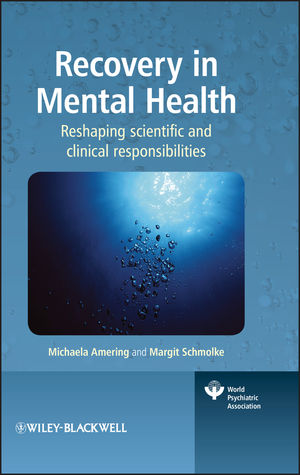Recovery in Mental Health: Reshaping scientific and clinical responsibilitiesISBN: 978-0-470-99796-3
Hardcover
280 pages
June 2009
 |
||||||
Foreword xi
1 Introduction 1
2 Recovery – Developments and Significance 5
3 Recovery – Basics and Concepts 9
Definition 9
Political Strategies 15
Collaboration with Users of Psychiatric Services 21
Resilience–a Dynamic Recovery-Factor 25
Recovery, Prevention and Health Promotion 40
Recovery and Quality of Life 52
Recovery and Empowerment 54
Recovery and Evidence-Based Medicine 56
Recovery and Remission 57
4 Personal Experience as Evidence and as a Basis for Model Development 61
‘Recovery – an Alien Concept’ - Ron Coleman/UK 61
‘Empowerment Model of Recovery’ – Dan Fisher and Laurie Ahern/USA 65
‘Conspiracy of Hope’ – Pat Deegan/USA 71
‘Holders of Hope’ – Helen Glover/Australia 78
‘Wellness Recovery Action Plan (WRAP)’ – Mary Ellen Copeland/USA 83
‘Two Sides of Recovery’ – Wilma Boevink/The Netherlands 89
‘No Empowerment Without Recovery’ – Christian Horvath/Austria 95
5 Recovery – Why Not? 99
The Slow Demise of Incurability 99
Incurability 99
Chronicity 100
Other misunderstandings 102
Is the glass half-full or half-empty? 103
A Diagnosis or a Verdict – The Example of Schizophrenia 103
Heterogeneity of Course Over Time 104
Prognosis – ‘From demoralizing pessimism to rational optimism’ 108
Diagnosis – ‘A century is enough’ 111
Scientific and Clinical responsibility 112
Classic Dimensions of Madness 117
Insight 117
Compliance 120
Capacity 122
Coercion 122
Psychiatric Treatment and Services 126
State of the Art 126
Shortcomings 129
Recent Developments 131
Stigma and Discrimination 134
Attitude Research 136
Iatrogenic Stigma 138
Stigma – Experiences and Expectations 140
Internalized Stigma and Stigma Resistance 141
Social Inclusion 145
The Hearing Voices Movement 148
6 Recovery – Implications for Scientific Responsibilities 153
New Directions 153
The Increasingly Active Role of UK Users in Clinical Research 156
Assessing Recovery 163
Ruth Ralph and the Recovery Advisory Group 163
Examples of Published Recovery Instruments 165
Recovery as a Process 168
Turning points – Living with Contradictions 168
Findings from four Countries 175
Identity and Recovery in PersonalAaccounts of Mental Illness 179
Recovery as lived in Everyday Practice 182
Qualitative Research as one Royal Road 187
7 Recovery – Implications for Clinical Responsibilities 189
Sharing 190
Alternatives 193
Recovery-Factors in Therapeutic Relationships and Psychiatric Services 195
Recovery-oriented Professionals 195
Recovery Self Assessment (RSA) 201
Measuring Recovery-Orientation in a Hospital Setting 202
Recovery Knowledge Inventory (RKI) 204
Developing Recovery Enhancing Environments Measure (DREEM) 206
Initiatives of the World Psychiatric Association 206
Psychiatry for the Person 206
A Person-centred Integrative Diagnosis 208
Recovery and Psychopharmacology 209
New goals and New Roles for Psychopharmacologists 209
Pat Deegan’s concept of ‘Personal Medicine’ 213
A Programme to support Shared Decision-Making 219
System Transformation 220
Recovery-Oriented Services 221
Recovery-Oriented Mental Health Programmes 222
A Recovery-Process Model 225
Practice guidelines for Recovery-Oriented Behavioral Health Care 228
Peer support and Consumer-Driven Transformation 230
8 The Significance of Discovering Recovery for the Authors 235
References 239
Index 260



